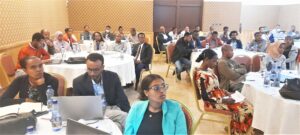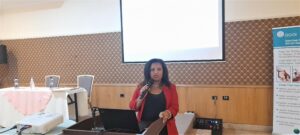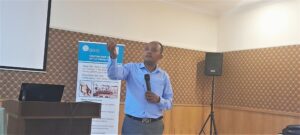The GCF-funded National Adaptation Plan (NAP) Readiness project of GGGI-Ethiopia, in close collaboration with the Ministry of Planning and Development (MoPD), organized a four-day training workshop on Result-Based -Monitoring and Evaluation (RB-M&E) from November 1-4, 2022 at Adama town of the Oromia region.
 The ultimate objectives of the training workshop were to keep the trainees abreast of the NAP-Eth readiness project’s implementation status and plan, clearly understand the core indicators of the Government of Ethiopia’s (GoE) Climate Resilient Green Economy (CRGE) strategy, enhance their understanding on the key principles and concepts of RB-M&E, as well as to develop their knowledge and skills on ways of designing and implementing M&E plan, logical frameworks, monitoring of results and evaluating outcomes and reporting.
The ultimate objectives of the training workshop were to keep the trainees abreast of the NAP-Eth readiness project’s implementation status and plan, clearly understand the core indicators of the Government of Ethiopia’s (GoE) Climate Resilient Green Economy (CRGE) strategy, enhance their understanding on the key principles and concepts of RB-M&E, as well as to develop their knowledge and skills on ways of designing and implementing M&E plan, logical frameworks, monitoring of results and evaluating outcomes and reporting.
The Workshop brought together 63 (M45, F18) largely statisticians and M&E experts drawn from Federal MoPD and regional bureaus of planning and development, regional plan Commissions as well as from relevant government sector offices including the Ethiopian Environmental Authority (EPA), Ministry of Finance ( MoF), Ethiopian Meteorological Institute (EMI), Ethiopian Statistical Service (ESS) and Ministry of Women and Social Affairs ( MoWSA), among others.
Ms. Medhin Fisseha, NAP -GCF Readiness Project Lead, provided highlights on the background of the project, and also unveiled the ultimate objectives of the training workshop.
 She remarked that the NAP -GCF Readiness project made unrelenting efforts toward enhancing the adaptive capacities of pertinent government offices to climate change and helping define priorities and fine-tuning the CRGE core indicators through organizing various and consultative platforms and capacity -building trainings.
She remarked that the NAP -GCF Readiness project made unrelenting efforts toward enhancing the adaptive capacities of pertinent government offices to climate change and helping define priorities and fine-tuning the CRGE core indicators through organizing various and consultative platforms and capacity -building trainings.
In his welcoming remarks, Dr. Gemedo Dalle, GGGI Ethiopia representative, briefed the participants on the founding goal and thematic programmatic solutions of GGGI, and its notable contribution to the formulation and development of CRGE strategy, which he said will enable the country to pursue a green growth pathway.
Dr. Gemedo reiterated that GGGI will remain committed to support the GoE , for building a climate resilient green economy is one of the strategic pillars of the country’s perspective development plan for the period 2021-2030.
The training workshop was officially opened by Ato Zerihun Melaku, Welfare and Poverty Analysis Team Leader at MoPD. He noted that the GoE has already declared the National Adaptation Plan (NAP) and has also taken mitigation measures to withstand the pervasive impacts of climate change in the country. He added that MoPD has joined forces with key development partners and aggressively been engaged in the resource mobilization ventures through developing bankable project proposals meant to back up the country’s green economy initiatives.
Moreover, he pointed out that the CRGE core indicators have been developed for eight sectors in tune with the country’s 10-Years Development Plans and the Nationally Determined Contributions ( NDCs) to the United Nations Framework Convention on Climate Change (UNFCCC).
He further stated that his Ministry has managed developing a digital M&E platform in a bid to support planning and trace result-based reports on a periodic basis.
Mr. Zerihun hailed GGGI for organizing such an important training platform and called upon the participates to actively participate and live up to their expectations.
Following was presentation on NAP-GCF Readiness Project and M&E status and plan by Ms. Azeb Lemma, M&E Senior Officer for the NAP-GCF Readiness Project. She has given highlights on NAP-ETH Strategic Priorities, as well as on “Outcome 6” of the Project which deals with the Monitoring, Evaluation and Learning (MEAL) aspect, and its respective outputs, activities, and key deliverables.
Another presentation was made under the theme “Final Revision of CRGE M&E Core Indicators for the Key Sectors” by Michael Hordofa, Senior Expert of Climate Change Mitigation at Ethiopia Environmental Protection Authority (EPA). He noted that the CRGE M&E core indicators framework comprises Sectoral Results, Outcome Indicators, Unit of Measurement, Baseline, Target, Frequency of data Collection, Responsibility of Monitoring and Data Source.
He noted that the indicators have passed through the refinement process to concretize the monitoring and evaluation frameworks and revise the core set of climate change indicators to be used as a basis for reporting climate change in alignment with the nationwide climate smart goals and targets.
Mr. Michael lauded the role of NAP- GCF Readiness Project in supporting NDA(EPA), which he said is instrumental in strengthening the existing M&E system and enhancing the implementing capacity of the mainstreaming sectors towards revisiting their core indicators.
He pointed out that the next step would largely focus on the baseline targets and data collection to align with CRGE, and endorsement of the core indicators by the key sectors of the Government during the steering committee meeting.
Following presentation, the RB-M&E training was facilitated by Mr. Adugna Nemera, Senior Expert from the World Resources Institute (WRI).
The training, which was given on an interactive and participatory fashion, covered key thematic areas including RBM Theories of Change (ToC) and Concepts of Monitoring and Evaluation, Designing Result-based Monitoring and Evaluation System, Monitoring of Results and Evaluation Outcomes, and Integration of NAP Priorities in the National M&E System, among others.
Outcome of the Training Workshop
By the end of the training workshop, the following results have been achieved:
- The awareness level of the trainees on the Core CRGE indicators enhanced;
- The understanding level of the trainees on theories and concepts of RB- M&E system increased;
- The trainees’ knowledge on how to design RB-M&E planning and logical framework analysis developed;
- The trainees ‘awareness on ways of integrating NAP priorities into the national M&E system enhanced;
- The trainees became well familiarized with the digital M&E platform adopted by the Ministry of Planning and Development.